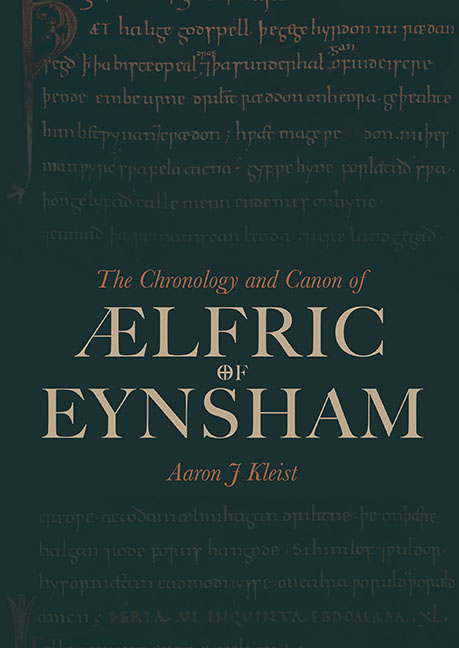3 - Ælfrician Manuscripts
Published online by Cambridge University Press: 15 October 2019
Summary
While for certain questions the above treatment of the Ælfrician Canon may serve well, identifying, for example, in which manuscripts copies of a text may be found, at other times it is the manuscript context one wants in view. How might the contents of D2 have coloured, say, the reading of Ælfric's First Series homily for Rogationtide (CH I.18) in twelfth-century Rochester? How might Ælfric's exegesis of Christ's calming of the storm and healing of the Gadarene demoniac (CH II.23.127–97 / SH II.17.203–76) have been heard if preached on the Third Sunday after Pentecost (as in K) as opposed to the Thirteenth Sunday after Pentecost (as in H)? If items were read sequentially for lectio diuina, for example, what difference might it have made for the Interrogationes Sigewulfi to follow Ælfric's account of Thomas’ passion (LS 32 [Skeat II.36]) in W, but to follow the Hexameron in S? Or for Ælfric's Second Old English Letter for Wulfstan in full to precede his Latin De septiformi spiritu in B, but for only an independent portion to precede De duodecim abusiuis in G? Or for De auaritia to appear independently between De uaniloquio neglegentium and a version of SH II.21 in R1, but embedded in a copy of CH II.19 in fb?
For all that Ker's Catalogue is indispensable when considering the contents of manuscripts in full, identifying Ælfrician elements therein is sometimes a labour of love. The following therefore offers a handy reference for those working specifically with an Ælfrician lens. It lists all witnesses to Ælfrician works; assigns sigla to manuscripts and transcriptions lacking a reference common to Clemoes, Godden, and Pope; delineates subdivisions within sigla to facilitate precision and limit confusion; furnishes dates, origin, and provenance according to Ker, Gneuss, and another authorities; offers explanatory notes; lists references to printed manuscript descriptions; details Ælfrician contents; and sets forth manuscript subdivisions where present in Budny, Clemoes, Godden, and Ker.
Manuscripts Referenced by Clemoes, Godden, and/or Pope
A
London, British Library, Royal 7 C. xii, fols 4r–218r (January–June 990, Cerne Abbas1)
Notes: The base manuscript for Clemoes’ edition, A constitutes the unique witness to the earliest known stage of Ælfric's First Series of Catholic Homilies, with notes in Ælfric's own hand.
- Type
- Chapter
- Information
- The Chronology and Canon of Ælfric of Eynsham , pp. 207 - 275Publisher: Boydell & BrewerPrint publication year: 2019

